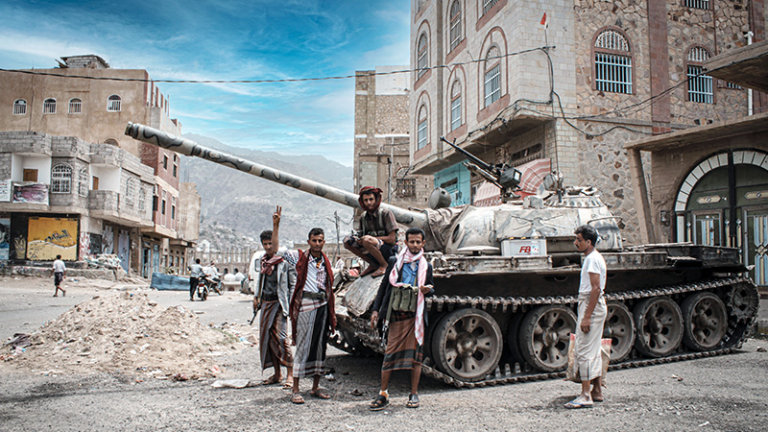
On April 1, 2022, the UN Special Envoy to Yemen, Hans Grundberg, announced a two-month truce between the country’s warring parties. This truce was extended twice, each time for two months. However, on October 2, 2022, it could not be extended further, although the truce continued in practice. Communication channels between Saudi Arabia and the Houthi rebels remained open, leading to an April 2023 visit by Saudi Arabia’s ambassador to Yemen, Mohammed Al-Jaber, to Sanaa. Al-Jaber met with Houthi leaders and conveyed optimism about reaching a lasting peace agreement. But despite continued efforts, no formal agreement materialized. In September 2023, a Houthi delegation visited Riyadh and met with Defense Minister Khalid bin Salman bin Abdul-Aziz, again expressing optimism about a potential agreement, but without any concrete outcome.
The outbreak of war in Gaza further escalated regional tensions, putting the de facto truce in Yemen at risk. The Houthis began targeting ships en route to the Israeli port of Eilat through the Bab Al-Mandab Strait in support of Gaza. In response, the United States and its western allies launched Operation “Prosperity Guardian” in December 2023 to counter Houthi actions. The Houthis continued to target ships and attempted to strike Eilat with missiles and drones, ultimately succeeding in a drone attack on Tel Aviv. Israel retaliated with an airstrike on the Yemeni port of Hodeidah, prompting the Houthis to vow revenge.
Amid these developments, tensions heightened further in July 2024 after the Central Bank of Yemen, now based in Aden, ordered Yemeni banks to relocate their headquarters from Sanaa within 60 days and revoked the licenses of six banks headquartered there. The Houthis perceived this as a move orchestrated by Saudi Arabia and threatened to strike Saudi airports and key facilities in retaliation, even releasing video footage of the threatened airports.
On July 23, 2024, an economic de-escalation agreement was announced between Yemen’s internationally recognized government in Aden and the Houthi group, which involved ending measures against banks and an increase in the number of flights from Sanaa Airport. Media reports suggested that Saudi Arabia urged the Aden government to de-escalate and reverse the banking measures. Despite the many tensions that could jeopardize the de facto truce, both Saudi Arabia and the Houthis appear committed to maintaining it, each for their own reasons, although this commitment has yet to yield a definitive end to the conflict.
Shared Interest in Maintaining the Truce
Saudi Arabia seems to have concluded that the war in Yemen is no longer in its interest. The Houthis have not been defeated or weakened; instead, they continue to control the most populated territories in the country. The war has also tarnished Saudi Arabia’s reputation, particularly due to allegations of serious human rights violations and accusations of causing a humanitarian disaster. Additionally, the ongoing conflict hinders Saudi Arabia’s economic diversification plans and the implementation of its Vision 2030 projects. The war’s financial burden, with Saudi Arabia spending approximately $265 billion by 2020, obstructs progress on major projects that require substantial investment. Moreover, the Houthis’ missile and drone attacks on vital Saudi infrastructure threaten the ability to attract the necessary foreign investment and tourism to support Vision 2030.
In this context, Saudi Arabia seeks to extend the truce and reach a peace agreement with the Houthis to prevent Yemen from becoming a platform for attacks on Saudi security and economic interests. Such an agreement would also help secure the Saudi-Yemeni border, much of which is controlled by the Houthis, and facilitate coordination in combating smuggling and human trafficking. Saudi Arabia may also hope that an agreement might reduce the Houthis’ reliance on Iranian support, making them less inclined to strengthen ties with Tehran, which would undermine the Islamic Republic’s influence in the kingdom’s backyard. The relationship between Iran and the Houthis is not a straightforward patron-client relationship, and Saudi Arabia believes that the Houthis’ ability to generate economic returns might encourage greater independence from Iran.
The Houthis are eager to reach an agreement with Saudi Arabia to establish themselves as the dominant political and military force in Yemen.
For their part, the Houthis are eager to reach an agreement with Saudi Arabia to establish themselves as the dominant political and military force in Yemen. Having proven their mettle in war and developed their military strength, the Houthis seek recognition as the primary and legitimate representative of the Yemeni people. In any political settlement within Yemen, the Houthis are expected to aim to secure a significant share of governance, particularly in the northern regions. Their desire to be the strongest party in ruling Yemen also drives their interest in addressing economic issues as part of the settlement, allowing them to present themselves as the force that revived the Yemeni economy and addressed the public’s needs after the war. This includes resolving public sector salary issues and securing a substantial share of oil revenues. The Houthis also want Saudi Arabia to play a significant role in Yemen’s post-war reconstruction.
Conversely, the internationally recognized government is likely the most apprehensive about a settlement, fearing that it would come at the expense of its own interests. This government recognizes that a political settlement would not restore its control over Yemen but might instead solidify the Houthis’ position as the dominant force in the country. With Saudi Arabia eager to exit the conflict with minimal damage, the internationally recognized government perceives itself as the weaker party in negotiations, likely to be forced into making concessions. This perception was reinforced by the economic de-escalation agreement, where the government reversed its economic measures out of fear of reigniting the war.
Obstacles to Reaching an Agreement
Despite the shared interest of Saudi Arabia and the Houthis in continuing the truce and reaching a peace agreement, progress has been slow. Several factors contribute to the difficulty in achieving a permanent peace agreement. One major obstacle is Saudi Arabia’s insistence on positioning itself as a mediator rather than a party to the conflict, arguing that it is facilitating negotiations between the Houthis and the internationally recognized government. The Houthis strongly reject this characterization, insisting that Saudi Arabia is a principal party to the war. They argue that a peace agreement must first be reached with Saudi Arabia to end the war and establish related arrangements before any talks with Yemeni parties under the internationally recognized government can take place. While the Houthis refuse to negotiate directly with the government, they are willing to engage with its constituent parties individually, as evidenced by their meeting with members of the Islah Party at Hamas headquarters in Sanaa.
Saudi Arabia seeks a cessation of hostilities, particularly the Houthi attacks on its territory. Meanwhile, the Houthis want to end the war with Saudi Arabia, secure compensation for the families of war victims, and ensure significant Saudi contributions to Yemen’s post-war reconstruction. This has effectively marginalized the internationally recognized government in favor of bilateral negotiations between Saudi Arabia and the Houthis. However, these negotiations have been prolonged, particularly regarding so-called “humanitarian issues,” such as the full reopening of Sanaa Airport and Hodeidah Port, and the opening of roads in certain governorates, especially Taiz.
One of the major sticking points in the negotiations is the issue of public sector salaries in Houthi-controlled areas. The payment of these salaries has been suspended since 2016, and the Houthis demand that the government pay them using oil revenues generated from areas under pro-government control in Shabwa, Marib, and Hadramawt. The government, however, refuses, as it relies heavily on these revenues, which are insufficient to cover all its expenses. The situation is further complicated by new challenges regarding oil revenues, particularly the economic and service-related demands of tribes in Hadramawt, who have recently taken military action to expropriate the governorate’s oil resources due to unmet demands.
Disagreements also persist over the mechanism for delivering salaries. While the Houthis demand that salaries be deposited in the Central Bank of Sanaa for distribution, the government insists on handling the payments through the Central Bank in Aden. There is also a dispute over the list of employees entitled to salaries: the government wants to use the pre-2014 payroll, while the Houthis want it updated to include all current government employees.
Compounding the difficulties in reaching an agrrement is the outbreak of the Gaza war and the Houthis’ subsequent involvement in supporting the Palestinian resistance.
Compounding these difficulties is the outbreak of the Gaza war and the Houthis’ subsequent involvement in supporting Hamas and other Palestinian resistance factions. The Houthis’ increasing involvement, culminating in Operation Prosperity Guardian led by the United States and its allies to secure navigation in the Red Sea, has escalated tensions. The Houthis’ threats to retaliate against Israel’s bombing of Hodeidah, combined with promises of military responses from their allies in the ‘Axis of Resistance,’ risk expanding the conflict to a broader regional scale.
The Gaza war has also negatively impacted the already faltering negotiations on a permanent resolution in Yemen. The United States, which had been pushing for a ceasefire in Yemen, has now entered the conflict with the Houthis, complicating the peace talks. Washington has urged Saudi Arabia to consider the Red Sea crisis in its negotiations and to slow down the peace process. Saudi Arabia has remained committed to preserving the fragile truce—although it was reported to have intercepted Houthi missiles aimed at Israel—and has been avoiding any actions that could reignite the Yemeni conflict. Saudi Arabia has refrained from participating in the US-led coalition in the Red Sea, refused to allow US fighter jets to use its airspace for strikes on Yemen, and denied that Israeli jets that struck Hodeidah crossed Saudi airspace. This cautious approach by Saudi Arabia has helped maintain the truce and preserve the hope of reaching a permanent peace agreement. The Houthis, too, have shown a desire to keep Saudi Arabia out of the broader regional conflict, focusing instead on confronting Israel and the United States.
Conclusion
The recent economic de-escalation agreement has helped reduce tensions, particularly in light of the Houthis’ threats to resume attacks on Saudi Arabia. This agreement could pave the way for discussions on other pending issues, such as the Sanaa Airport, the Hodeidah Port, and the salary dispute, but regional tensions resulting from the Israel-Gaza conflict pose significant challenges to achieving a permanent peace agreement. While Saudi Arabia and the Houthis share an interest in reducing tensions and maintaining the de facto truce, the volatile regional context offers no guarantees that the truce will hold. Furthermore, the continuation of the truce in its current form does not resolve many of Yemen’s unresolved issues, which could erupt at any moment, particularly given the complex internal dynamics and dire economic and living conditions in the country.
It is also important to note that even if Saudi Arabia and the Houthis were to reach a final agreement to end the war, this would not necessarily resolve the broader Yemeni crisis. Resolving the conflict requires a comprehensive internal settlement involving all Yemeni factions, which will demand considerable effort. This process is complicated by Yemen’s numerous internal contradictions, the multitude of local issues that need to be addressed, and the involvement of regional actors who continue to support various parties in the conflict. Therefore, while the Saudi-Houthi dialogue is a critical step toward peace, it is only one part of a much larger and more intricate puzzle that must be pieced together to achieve lasting stability in Yemen.
The views expressed in this publication are the author’s own and do not necessarily reflect the position of Arab Center Washington DC, its staff, or its Board of Directors.

